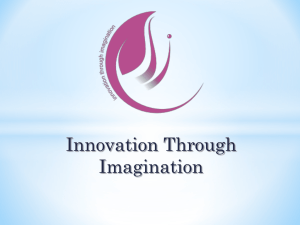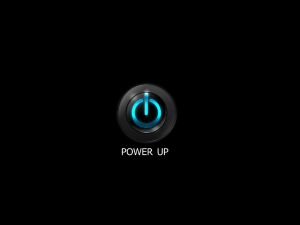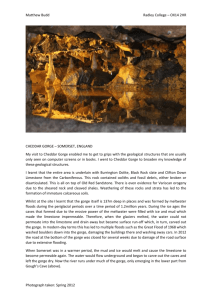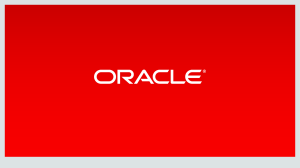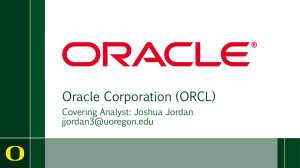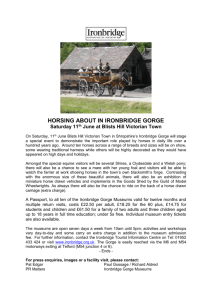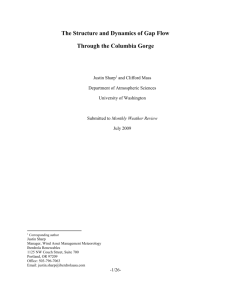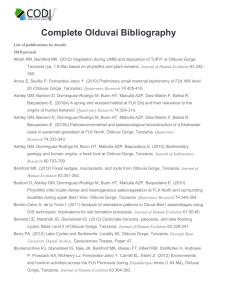Levadia or livadeia my hometown
advertisement
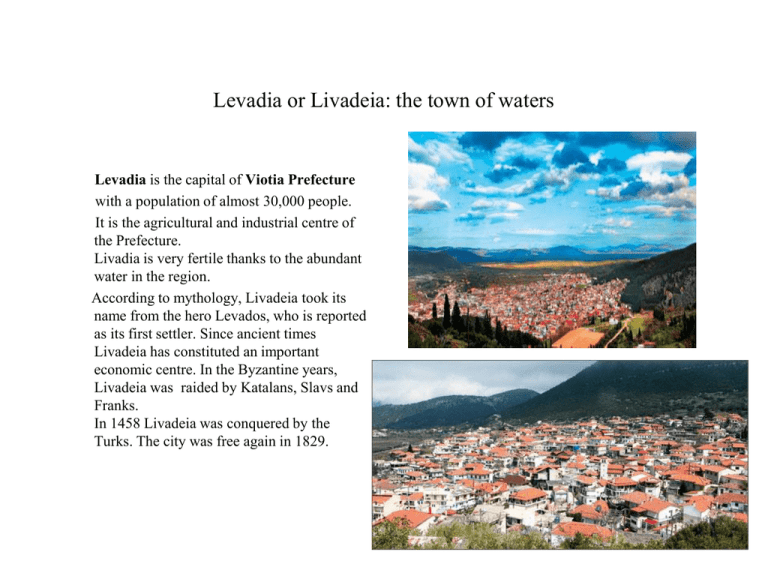
Levadia or Livadeia: the town of waters Levadia is the capital of Viotia Prefecture with a population of almost 30,000 people. It is the agricultural and industrial centre of the Prefecture. Livadia is very fertile thanks to the abundant water in the region. According to mythology, Livadeia took its name from the hero Levados, who is reported as its first settler. Since ancient times Livadeia has constituted an important economic centre. In the Byzantine years, Livadeia was raided by Katalans, Slavs and Franks. In 1458 Livadeia was conquered by the Turks. The city was free again in 1829. Trofonius oracle • • In ancient times Livadia was known with the name of Mideia built on the bank of the river Erkina. Ruins of the city (market, baths, streets) have been found. The city was known as the site of the famous Oracle of Zeus Trofonios. The oracle was used as a stage before visiting the oracle of Delphi, and as such, it acquired great power and riches. Scholars have identified the location of the sanctuary of Zeus and the Oracle. Ruins of the oracle are saved at the sources of the river Erkyna. In the same area there were places of worship of Gods and Goddess like Artemis, Hermes, Dionysus and of the Deities of childbirth, but also the Holy of Apollo and Dimitra. Temple of Olympian Zeus Ruins of the Temple of Olympian Zeus The castle • It is one of the four Catalan castles in the country. It dates back to the 14th century. Works of maintenance and renovation have made the Castle easily accessible. The visitor can walk through the walls and enjoy the impressive view of the gorge of Krya. The Tower Clock • The tower was built at the period of the Frankish domination, while the clock was given to the city by Lord Elgjn at 1803, because he wanted, by this way, to be given permission to excavate the region in order to find the oracle of Trofonius. The Watermill • An old cotton factory at the beginning of the 20th century operated by water power. Today the installations have been restored and constitute a model cultural centre with conference and exhibition halls, restaurants, cafes, etc. Historical and Ethnological Museum • • It is housed in the underground of an old flour factory in the banks of the river. The residents used to wash their traditional woven carpets there. In the museum there are many objects of domestic use (tools of weaving, rural objects and grinding machines). Museum of old professions • The Museum was organised by the Commercial Association of Levadia. The area of Kria • • • The most interesting sight of Livadeia is the area of Kria (meaning cold in Greek). During the last few years the Municipality has been proceeding to a large-scale intervention pertaining to the restoration of the city’s historical centre, around the springs of Krya and the river Erkyna. Industrial, historical and listed buildings have been restored, the riverside areas have been reformed and unified, architectural monuments have been restored. The last stage is in progress: it regards the creation of a social and environmental development park in the river’s section that is close to the city’s exit to the north. The river Erkina • The particular beauty of the city is due to the river Erkina crossing the whole town. The way along the river is very beautiful with stone bridges, old buildings, channels, stone benches, etc. Also, the area of Kria constitutes a landscape of unique natural beauty and a place for recreation. The gorge of Krya • Works have been made on the road leading to the gorge of Krya. Thus, the visitor can walk at a length of 500 metres in the gorge. The paved street leads to a square, beyond which, the walk continues in a relatively rough path, leading to the Bridge Trihino. The open stone theatre • In the area, there is also a stone theatre that holds cultural events. In all the region of Krya, many renovations of historical or industrial buildings, unifications of places and restorations of monuments have been made. Celebrations • • • Easter The City of Levadia is well-known for its traditional Greek Easter celebrations. On Easter day people of Levadia light open fires and roast whole lamb on the spit and other traditional meat dishes. Visitors are invited to eat, drink and dance with the local inhabitants. Traditional music is played and traditional dance groups perform. Celebrations • Halloween • The traditional custom "Gaitanaki", on Sunday during the feast of Carnival. Halloween is celebrated at the beginning of spring.People gather at the central square and dance around the maypole. Celebrations • Day of the patron saint • The patron saint of Levadia is Theotokos (God-bearer), the mother of Jesus. On the 21st of November ‘The Presentation of the Virgin in the Temple’ is celebrated in Levadia. It is a religious holiday and the holly icon of Maria is carried around the town. • Events Trofonia • Every September, the municipality of Levadia organizes the “Trofonia” festival, a series of 20 days cultural events in the open theatre, in the Gorge of Krya, with theatrical and dance performances, concerts, exhibitions, happenings etc. Events • Trade fair (panyghiri) • By 26 October to 2 November a big trade fair takes place in the city. It is an open air market with many products at bargain prices, fun fairs, foods, music, etc
